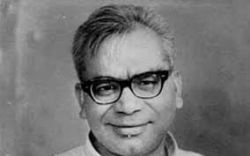Ram Manohar Lohia: Difference between revisions
Masterman087 (talk | contribs) |
No edit summary |
||
| (One intermediate revision by the same user not shown) | |||
| Line 1: | Line 1: | ||
{{#seo: | {{#seo: | ||
|title=Ram Manohar Lohia – Socialist Leader | |title=Ram Manohar Lohia Biography – Indian Socialist Leader & Freedom Fighter | ||
|description= | |description=Ram Manohar Lohia was a prominent Indian freedom fighter and socialist political leader. Known for his advocacy of social justice, equality, and anti-colonial activism, he played a key role in India’s political and social reforms. | ||
|keywords=Ram Manohar Lohia, | |keywords=Ram Manohar Lohia Biography, Indian freedom fighter, socialist leader, Indian politics, social justice, anti-colonial activism, Indian socialist movement | ||
|image=Ram Manohar Lohia.jpg | |image=https://knowlepedia.org/images/Ram Manohar Lohia.jpg | ||
|og:type=article | |||
|og:title=Ram Manohar Lohia – Champion of Socialism & Equality in India | |||
|og:description=Learn about the life, work, and legacy of Ram Manohar Lohia, a key figure in India’s socialist movement and advocate for social justice and equality. | |||
|og:image=https://knowlepedia.org/images/Ram Manohar Lohia.jpg | |||
|twitter:card=summary_large_image | |||
}} {{Infobox deceased | }} {{Infobox deceased | ||
| name = Ram Manohar Lohia | | name = Ram Manohar Lohia | ||
| Line 9: | Line 14: | ||
| image_caption = Dr. Ram Manohar Lohia | | image_caption = Dr. Ram Manohar Lohia | ||
| birth_date = {{Birth date|1910|03|23}} | | birth_date = {{Birth date|1910|03|23}} | ||
| birth_place = | | birth_place = Akbarpur, [[Uttar Pradesh]], British India | ||
| death_date = {{Death date and age|1967|10|12|1910|03|23}} | | death_date = {{Death date and age|1967|10|12|1910|03|23}} | ||
| death_place = [[New Delhi]], [[India]] | | death_place = [[New Delhi]], [[India]] | ||
| resting_place = | | resting_place = Rajghat vicinity, [[New Delhi]] | ||
| nationality = Indian | | nationality = Indian | ||
| occupation = Freedom Fighter, Political Leader, Socialist Thinker | | occupation = Freedom Fighter, Political Leader, Socialist Thinker | ||
| years_active = 1930–1967 | | years_active = 1930–1967 | ||
| known_for = | | known_for = Congress Radio, Lohiaism, Anti-Congress Politics, Socialist Thought | ||
| notable_works = ''Wheel of History'', ''Marx, Gandhi and Socialism'', ''Fragments of a World Mind'' | | notable_works = ''Wheel of History'', ''Marx, Gandhi and Socialism'', ''Fragments of a World Mind'' | ||
| awards = National Recognition (Posthumous), Institutions named after him | | awards = National Recognition (Posthumous), Institutions named after him | ||
| spouse = None | | spouse = None | ||
| children = None | | children = None | ||
| parents = Hira Lal Lohia (father), Chanda (mother) | | parents = Hira Lal Lohia (father), | ||
Chanda (mother) | |||
| religion = [[Hinduism]] | | religion = [[Hinduism]] | ||
}} | }} | ||
'''Dr. Ram Manohar Lohia''' (23 March 1910 – 12 October 1967) was a prominent Indian freedom fighter, socialist political leader, and one of the most original thinkers in post-independence Indian politics. He is remembered for his advocacy of equality, Hindi as a national language, and for challenging the dominance of the Congress Party in independent India. | '''Dr. Ram Manohar Lohia''' (23 March 1910 – 12 October 1967) was a prominent Indian freedom fighter, socialist political leader, and one of the most original thinkers in post-independence Indian politics. He is remembered for his advocacy of equality, Hindi as a national language, and for challenging the dominance of the Congress Party in independent India. | ||
== Early Life and Education == | == Early Life and Education == | ||
Born in Akbarpur, United Provinces, Lohia lost his mother at a young age and was raised by his father, a nationalist and advocate. He pursued higher education at the University of Calcutta and later earned his Ph.D. in economics from the University of Berlin in Germany, where he was deeply influenced by socialism and anti-imperialist thoughts. | Born in Akbarpur, United Provinces, Lohia lost his mother at a young age and was raised by his father, a nationalist and advocate. He pursued higher education at the University of Calcutta and later earned his Ph.D. in economics from the University of Berlin in Germany, where he was deeply influenced by socialism and anti-imperialist thoughts. | ||
== Role in Freedom Struggle == | == Role in Freedom Struggle == | ||
Lohia joined the [[Indian National Congress]] and became a close associate of [[Jawaharlal Nehru]] and [[Subhas Chandra Bose]]. During the [[Quit India Movement]], he launched the underground radio station called '''Congress Radio''', which broadcast messages against British rule. | Lohia joined the [[Indian National Congress]] and became a close associate of [[Jawaharlal Nehru]] and [[Subhas Chandra Bose]]. During the [[Quit India Movement]], he launched the underground radio station called '''Congress Radio''', which broadcast messages against British rule. He was arrested multiple times and spent several years in British jails. | ||
== Post-Independence Politics == | == Post-Independence Politics == | ||
| Line 48: | Line 54: | ||
== Death and Legacy == | == Death and Legacy == | ||
Lohia died in 1967 at the age of 57 in [[New Delhi]] after a brief illness. His legacy continues through: | Lohia died in 1967 at the age of 57 in [[New Delhi]] after a brief illness. His legacy continues through: | ||
* Universities and institutions named in his honor (e.g., | * Universities and institutions named in his honor (e.g., Dr. Ram Manohar Lohia Hospital, RMLNLU) | ||
* Revered by socialist leaders like [[Mulayam Singh Yadav]], [[Lalu Prasad Yadav]], and [[Nitish Kumar]] | * Revered by socialist leaders like [[Mulayam Singh Yadav]], [[Lalu Prasad Yadav]], and [[Nitish Kumar]] | ||
* A source of ideological inspiration for anti-Congress and pro-social justice politics | * A source of ideological inspiration for anti-Congress and pro-social justice politics | ||
== See Also == | == See Also == | ||
* | * Congress Radio | ||
* | * Samyukta Socialist Party | ||
* | * Lohiaism | ||
* | * Indian Freedom Struggle | ||
* | * Ram Manohar Lohia Hospital | ||
== References == | == References == | ||
| Line 64: | Line 70: | ||
[[Category:Articles needing expansion]] | [[Category:Articles needing expansion]] | ||
[[Category:Articles needing more references]] | [[Category:Articles needing more references]] | ||
[[Category:Indian socialists]] | |||
[[Category:Indian independence activists]] | |||
[[Category:Indian politicians]] | |||
[[Category:Indian activists]] | |||
[[Category:Indian writers]] | |||
[[Category:People from Uttar Pradesh]] | |||
[[Category:Indian National Congress politicians]] | |||
[[Category:Samajwadi Party politicians]] | |||
[[Category:1910 births]] | |||
[[Category:1967 deaths]] | |||
Latest revision as of 07:15, 26 August 2025
| Ram Manohar Lohia | |
|---|---|

| |
| Dr. Ram Manohar Lohia | |
| Born | 23 March 1910 |
| Birthplace | Akbarpur, Uttar Pradesh, British India |
| Died | 12 October 1967 (aged 57) |
| Place of death | New Delhi, India |
| Resting place | Rajghat vicinity, New Delhi |
| Nationality | Indian |
| Occupation | Freedom Fighter, Political Leader, Socialist Thinker |
| Years active | 1930–1967 |
| Known for | Congress Radio, Lohiaism, Anti-Congress Politics, Socialist Thought |
| Notable works | Wheel of History, Marx, Gandhi and Socialism, Fragments of a World Mind |
| Awards | National Recognition (Posthumous), Institutions named after him |
| Spouse(s) | None |
| Children | None |
| Parents | Hira Lal Lohia (father),
Chanda (mother) |
| Religion | Hinduism |
| Website | |
Dr. Ram Manohar Lohia (23 March 1910 – 12 October 1967) was a prominent Indian freedom fighter, socialist political leader, and one of the most original thinkers in post-independence Indian politics. He is remembered for his advocacy of equality, Hindi as a national language, and for challenging the dominance of the Congress Party in independent India.
Early Life and Education
Born in Akbarpur, United Provinces, Lohia lost his mother at a young age and was raised by his father, a nationalist and advocate. He pursued higher education at the University of Calcutta and later earned his Ph.D. in economics from the University of Berlin in Germany, where he was deeply influenced by socialism and anti-imperialist thoughts.
Role in Freedom Struggle
Lohia joined the Indian National Congress and became a close associate of Jawaharlal Nehru and Subhas Chandra Bose. During the Quit India Movement, he launched the underground radio station called Congress Radio, which broadcast messages against British rule. He was arrested multiple times and spent several years in British jails.
Post-Independence Politics
After independence, Lohia became a vocal critic of Nehruvian socialism and centralization. He founded the Praja Socialist Party and later the Samyukta Socialist Party (SSP). His political thought, often called Lohiaism, was a blend of socialism, anti-casteism, and nationalism.
He also led several mass movements on issues like:
- Caste discrimination and untouchability
- Promotion of Hindi and regional languages
- Advocacy for women's rights and farmers' issues
Ideology and Contributions
Lohia's ideology focused on:
- Sapta Kranti (Seven Revolutions) – including revolutions against inequality based on caste, gender, race, wealth, and colonialism
- Opposition to both capitalism and communism – a third alternative socialism rooted in Indian realities
- Decentralization of power
Death and Legacy
Lohia died in 1967 at the age of 57 in New Delhi after a brief illness. His legacy continues through:
- Universities and institutions named in his honor (e.g., Dr. Ram Manohar Lohia Hospital, RMLNLU)
- Revered by socialist leaders like Mulayam Singh Yadav, Lalu Prasad Yadav, and Nitish Kumar
- A source of ideological inspiration for anti-Congress and pro-social justice politics
See Also
- Congress Radio
- Samyukta Socialist Party
- Lohiaism
- Indian Freedom Struggle
- Ram Manohar Lohia Hospital

